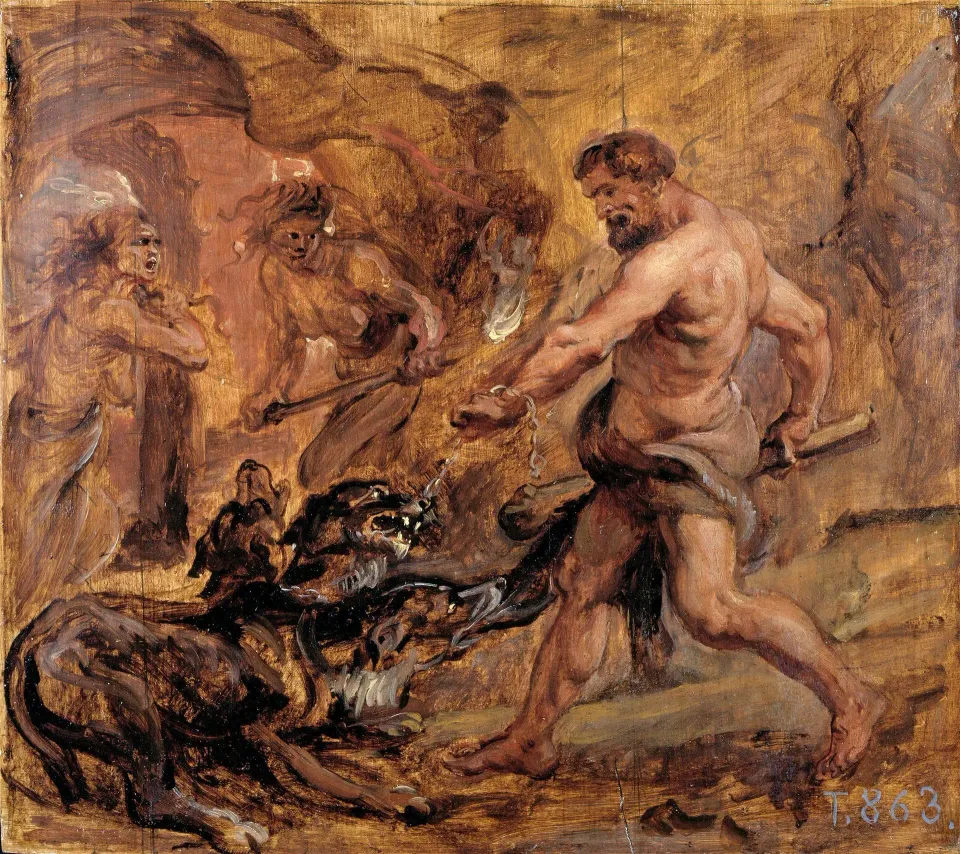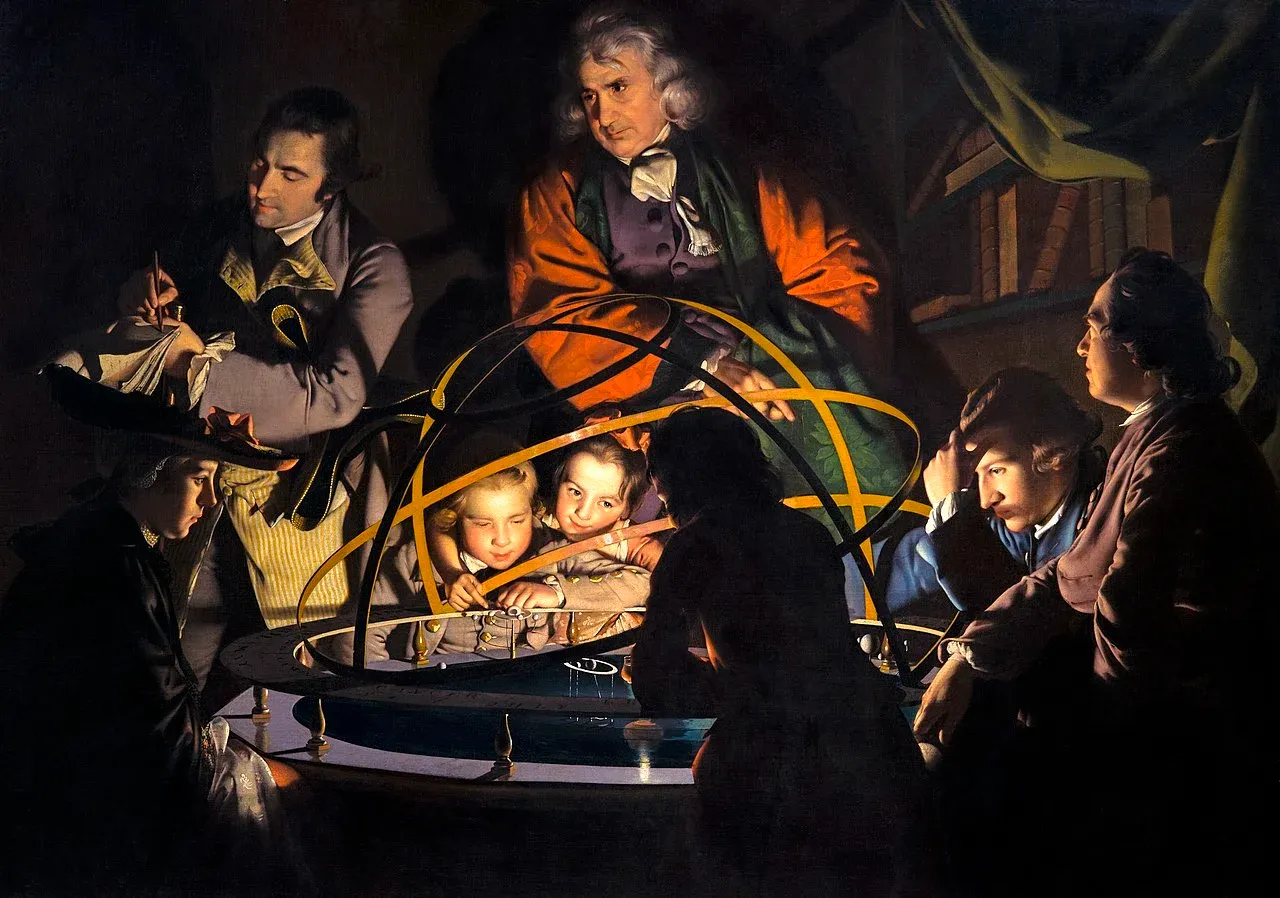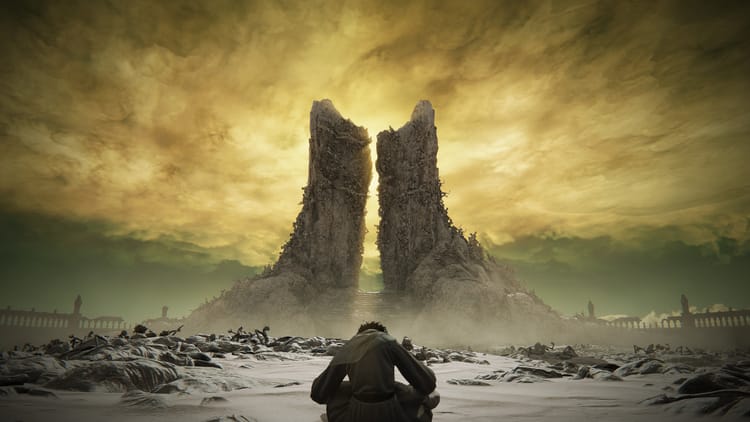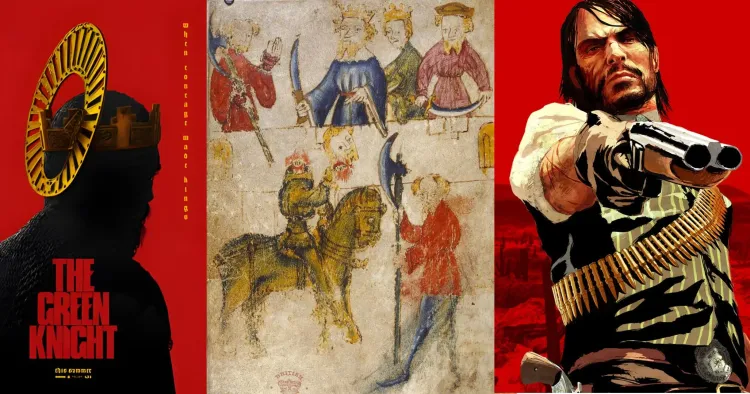The Fifth Head of Cerberus: Notes on a Neglected Masterpiece

After finishing The Book of the New Sun last month (which I wrote about in my previous post), I turned towards Gene Wolfe’s breakthrough novel The Fifth Head of Cerberus. It is, just as New Sun, a head-scratching, engrossing, confusing, and challenging book. All the more impressive for how short it is by comparison (which is nice, since it makes the requisite re-read easier). A metafiction in the vein of Nabokov or Borges (one of Wolfe’s favorites), it comprises three novellas—each very distinct from the other and telling different stories that ultimately cohere into one narrative, albeit a narrative without clear answers or definitive interpretations.
The Fifth Head of Cerberus is ultimately a post-colonial novel, but its treatment is unique in that the story takes place two hundred years after first contact. Two planets—Saint Anne and Saint Croix—orbit each other. Colonized first by the French, who later lost political power in a war, humans are the dominant species. Their culture is in decay, with Saint Croix governed by a Kafkaesque bureaucracy that oversees a brutal slave-trading society; on Saint Anne, however, there are whispers and legends of an indigenous people—the Annese—who lived there before humans arrived. But the Annese are all gone; it seems they were wiped out. As the anthropologist character John V. Marsch speculates, “To this indigenous people, humankind and the technological culture must have proved more toxic than to any other aboriginal group in history.”
Seems plausible, but there are other theories. Perhaps the Annese are still around, just in hiding. Or, perhaps they never existed—they are simply legends that morphed and drifted through time to the present. Or, maybe, the truth is even stranger than is dreamt of in these theories…
Space colonization and first contact with alien life is a mainstay of sci-fi. A lot of mid-century “golden age” sci-fi depicted optimistic and progressive versions of these efforts. Asimov’s Foundation series, though it depicts history as cycling through cataclysm and rebirth, nevertheless maintains a progressive (in fact, almost lawlike) upward trend towards more technology, more science, and more intellectual freedom—even if it is interrupted from time to time by quasi-religious “dark ages.” Arthur C. Clarke, too, showed human evolution as one of inevitable progress—particularly in Childhood’s End, which imagines a higher plane of human existence to which we can be uplifted by (mostly) benevolent alien overseers.
This is where The Fifth Head of Cerberus charts a different path. The story takes place two hundred years after first contact, long after the Annese—if they existed—vanished without a trace. The humans that live on the two planets are not explorers and colonists but, by now, longtime residents. Wolfe’s focus, then, is on the interplay of technology, science, and this idea of progress (which, I think, he depicts as mostly a self-indulgent myth), and he highlights the way humanity itself might be at stake.
The Mysteries of The Fifth Head of Cerberus

(Major Spoilers for The Fifth Head of Cerberus follow)
The novel is a complex, fragmented book that tells a complex, fragmented story. Intertwining like a double helix are the complementary tales of Number Five and John V. Marsch, both imprisoned for what appears to be the same crime: the killing of Number Five’s father. The identity of both men, however, is ambiguous.
Marsch arrives on Saint Anne long before the novel starts, intent on making a name for himself in academia back on Earth. He is a rather brutish stand-in for ravenous imperialism, less interested in knowledge than in power. He is a thrill-seeker, adventurer, and big game hunter. “I used to read the accounts of the pith helmet and puttee expeditions of the Victorians,” he writes in his diary, “when they used hundreds of bearers and diggers and what not, and filled with Gutenberg courage, dream of leading such a thing myself.” He admits that when he left Earth, he was mostly interested in the prestige such research would afford him. When the prospect of finding an Annese woman seems possible, he exudes, “I wouldn’t harm her, and the expedition would be a success and I would be famous.”
He seems to be a poor scholar. When he suspects his guide, the boy V.R.T., to be hiding a possible Annese presence, Marsch asks with a naivety so extreme it becomes mendacity, “Didn’t you notice that the anthropologists never harm the people they’re studying?” He is, unlike virtually every other academic, intimately familiar with myriad firearms and is a good shot with a rifle. A wake of fauna is left in his path as he navigates Saint Anne. He is proud of a particularly difficult shot that felled a dangerous beast and wishes he could mount its head on his wall. When V.R.T. sees the carcass, he begins to cry.
But who Marsch is gets muddied considerably by the end of the novel while he is rotting away in prison. The reader learns—only by innuendo and implication, and often not on the first read—that V.R.T. has taken Marsch’s place after he died on the expedition. (At least, this is the most common interpretation for his behavioral and personality changes over the course of the novel). While he is in prison, V.R.T./Marsch seems to not understand why he was arrested (though that could be a facade), and he is badgered by the interrogator Constant.
I took this name to have double symbolism. First, I suspect it is a reference to Benjamin Constant, the Franco-Swiss thinker who helped build the intellectual edifice of liberalism in the 19th century. Wolfe’s Constant gives quizzes and lectures on the relation of freedom to slavery, as well as the benefits of Saint Croix’s society, throwing into light the paradoxes of liberalism: a political ideology oriented around freedom, progress, open markets, and science, which was coterminous—seemingly inherently—with colonialism, imperialism, slavery, and war. Second, Constant’s name ironically implies stasis and lack of change. Progress is central to liberalism’s self-understanding, but Saint Croix labors under an autocratic government and a decayed, atrophied culture. Marsch remarks upon visiting how the houses appear to be 200 years old—almost like museum exhibits. This society built on science (and slavery) has nevertheless ossified into a backwater incapable of change. This small critique of Saint Croix can easily double as a larger critique of the contradictions of liberal political philosophy: an ideology boasting of freedom built on the back of slave labor; a philosophy rooted in notions of progress that nevertheless leads to an eternal, post-historical Now—the “unnameable present” of Roberto Calasso.
First and Last Contact

Marsch’s remark on the age of Saint Croix’s buildings is where his story intersects with Number Five’s. The narrator of the first-hand memoir that makes up the first novella of The Fifth Head of Cerberus, Number Five’s tale eventually culminates in the patricide that gets both him and Marsch arrested. Number Five (whose real name is probably Gene Wolfe) learns over the course of his life that he is actually a clone of his domineering father Maître, a scientist, genetic engineer, and brothelkeeper. He and his brother, David, are seemingly raised to take Maître’s place (as he did his father), and both are tutored by a robot, Mr. Million, who is actually a digital simulation of their great-grandfather. Thus the whole system, which seems at first like the linear progress of family descent, turns out to be a perpetual presentism in which the family never changes. History ceases to exist.
In one of the most famous scenes of the novel, David and Number Five are ordered by Mr. Million to practice their rhetorical skills by debating the humanity of the long-vanished Annese. After some simplistic efforts, including Five's comment about their lack of descent from Adam and Eve, David makes a penetrating observation. “It would be dangerous to let them be human because they’d ask for things,” he says, “but with them dead it makes it more interesting if they were, and the settlers killed them all.” The death of the Annese is the only thing that grants them their humanity because all it costs now is guilt. Misty-eyed humans in the present can gnash their teeth and rend their clothes about this injustice, because such talk and action is cheap. If the Annese were still around, the burden of reparations and justice would be too onerous to countenance. As Brian Evenson writes in the introduction, “A conquering force can only acquiesce to the humanity of the conquered as long as that conquered has been wiped out or, perhaps, has been so fully assimilated as to be no longer distinct.” Only the dead have rights.
The key ideas from post-colonial analysis of literature and history that Wolfe explores, however, are the concepts of hybridity, syncretism, and (the blurring of) boundaries. And in Fifth Head of Cerberus, the identity of the colonists themselves starts to get nebulous.
One solution to the disappearance of the Annese is known as Veil’s hypothesis. This theory states that the Annese were an indigenous race (or perhaps multiple races) of shapeshifters, who killed the human colonists when they arrived, took their form, and then have persisted in a simulacrum of humanity for so long they have forgotten their origins. The identity of both the Annese and the humans has eroded beyond recognition. Number Five’s aunt tells him that Veil came up with this theory because he wanted “dramatic explanation for the cruelty and irrationality he sees around him.” This could mean several things: perhaps it explains the cruelty of the present-day society on Saint Croix, which might find its origins in massacre; or maybe it deletes from history the unfathomable cruelty of the original contact, in which the genocide of the Annese would have been the birth of the colony. Veil’s hypothesis is granted strength later when V.R.T. takes on Marsch’s identity, the implication being that he is one of the long-veiled Annese who still remembers something of their origin (though not everyone agrees on this).
There are so many ways to interpret this story, so many valences and nuances (and nothing set in stone, no real certainty), that it is impossible to get one’s head around it. There is commentary here on the way a colonizing force will assimilate its indigenous victims into itself and obliterate their identity. There is a suggestion that memory of the initial event of first contact must be forgotten for society to function. And there is the tantalizing idea that humans themselves lose their identity in the act of subjugating another—that “boldly going” to another planet and colonizing it could be fatal. What is left of such an effort may look like humanity, may talk and act like it, but might in truth be something altogether different: a new form of the human, no longer the fallen but noble descendant of Adam and Eve but a humanity born out of primordial cosmic violence like Marduk slaying Tiamat.
The Myth of Progress

Psalm 8:4-5 reads, “What is man, that thou art mindful of him? and the son of man, that thou visitest him? For thou hast made him a little lower than the angels, and hast crowned him with glory and honour.” Humanity occupies a space between the angels and beasts—a little higher than the latter, a little lower than the former. In The Firth Head of Cerberus, this middle is extinguished. As the Old Wise One says in “‘A Story’ by John V. Marsch” (the dreamlike novella of first contact written by, presumably, V.R.T./Marsch), “When we die at last we have been greater than God and less than beasts.” Perhaps it is both at once—in reaching for the stars, humanity descended below animals in barbarity. It is a new cosmic fall and a new paradise lost.
Central to the modern West's self-understanding is the etiolated story of science’s rise from benighted religiosity and the so-called “dark ages.” This myth (here understood not as a “false story” per se but as a story that explains a culture, the religious sense of “myth”) gives meaning to scientific investigation, experimentation, and the exploration of nature, and it helps us understand ourselves as the supposedly rationalistic and scientific liberal society that we claim to be. It replaces the old story of cosmic fall and redemption with a slow, gradual emergence from nothingness into everything. It is a myth in the grandest sense of the word: a powerful, compelling, and dramatic story, immortalized in its genesis narrative of Galileo standing before the Inquisition. We usually summarize it with one word: progress. In Saint Croix, Wolfe depicts a society that embraces this myth intellectually but undercuts it socially.
One of the realest dangers of this myth is its ability to justify immoral acts in the name of progressive advance in knowledge. Wolfe attempts to show this by depicting a research edifice in Saint Croix built wholly on brutal exploitation. Maître’s research on cloning and genetic engineering is funded by his maintenance of a popular brothel. He is a man of great political power and prestige—even the autocratic politicians are wary of him. It is likely that many of the slaves bought and sold in Saint Croix’s markets might actually be the botched engineering projects of earlier experiments. Some of these creations might even be deliberate. Reaping the financial and political benefits of the two oldest forms of flesh trade, Maître is able to support his cutting-edge research and push the boundaries of genetics.
As Wolfe depicts it, such experimentation can go two ways. If experiment is bound by moral strictures—philosophical in nature and not something science can discover on its own—then it is a great good, and can be the engine for human flourishing (such as, perhaps, curing cancer or discovering methods of renewable energy). But it can be a great evil if it is not so bound, if its only end is “progress”—that is, more knowledge, all knowledge, for its own sake, ungoverned by ethics. This form of experiment—the kind undertaken by Maître—can be understood as the old danger of curiositas.
As theologian Paul Griffiths describes it, curiositas is a forgotten vice. We do not think that something like curiosity could be a bad thing (save for the one idiom we have about the way it killed the cat), but it was formerly considered disordered. It is a desire for knowledge, but not a healthy desire—instead, it is animated by the lust for dominion and control, the possession of the object studied (as was evident in early Baconian science and its aim to assert domination over the Earth, an idea whose consequences our environment and ecology are feeling with acute effect). Rather than a love for knowledge and learning, curiositas is more like a hatred for what is not yet known. It makes sense, then, that Maître’s violent experimentation on not only the denizens of Saint Croix but also his own sons (and himself) would be financially supported by other vices. It is all part of the same system, and the ends are seen as justifying the means. The knowledge gained by such genetic research is, after all, progress worth the price paid. It might even be the only thing keeping this society from falling apart.
Number Five is raised to one day supplant his father, but he actually becomes Maître long before he kills him and takes his place. When Number Five, David, and Phaedria come across a sickly slave during part of a heist, Number Five’s interest in him is purely curiositas. Noticing that he has four arms, his scientific curiosity gets the best of him. “The striking thing to me,” he says, “is that he seems to have full use of the grafted pair. Unless you’ve got identical twins to work with, the nerve endings almost never join properly, and whoever did this probably had a hundred failures before he got what he wanted. That slave must be worth a fortune.” Such ruminations indicate his mindset has become more like Joseph Mengele’s than a sane scientific researcher's. Number Five’s only goal, then, is to perform an experiment. “I wanted to perform an exploratory operation on the creature,” he admits, “much more than David or Phaedria had ever wanted money.” His only guiding principle now is curiositas.
It is at this point, that Number Five actually becomes Maître and is ready to replace him. They kill the slave and don’t even take the money, essentially sacrificing him for no reason. From then on, Number Five is animated by a callous disregard for all others. When he encounters another slave at the market—and notices his own face in him, suggesting he is another forsaken clone—Five’s only emotion is hatred. Formerly, Number Five admits, he would have bought and freed him, “but he answered me in the servile way of slaves and I turned away in disgust.” As he prepares to assassinate Maître, he writes that he is contemplating “the destruction of my self,” but we all can see that this has already happened. Number Five is gone, only Maître remains. But what is left is not human. It is only a simulacra. The end point of this destruction is a hell-on-earth, which is depicted rather blatantly in the address of the brothel: 666 Saltimbanque, the bordello complete with a statue of Cerberus guarding the entrance.
There is, however, another kind of pursuit of knowledge. Studiositas, rather than curiositas, is animated by a sincere effort to understand, a moral approach to learning in which one is balanced and grounded by other virtues. It is something that cannot be acquired simply by blind fealty to progress-at-all-costs. Griffiths believes it must be supported by caritas, or charity—that most Christian of virtues. It is within this framework that study and experiment can be undertaken with humility.
Space Colonization in the Present

All this then brings us to the present and the numerous gestures made towards colonizing Mars. I feel conflicted about this. Part of me thrills at the idea of space travel and the expansion of humanity throughout the solar system. As someone who grew up on Star Wars and endless other sci-fi stories, this sounds like the most exciting thing possible. Furthermore, criticizing it at all can make one come across as some kind of reactionary crank who hates technology as such (which I am not and never want to be). Such exploration seems to us, above all, a self-evident good. But there are two elements to consider here: extra-solar colonization of planets far away and which might, for all we know, have life on them. The other is colonization within our solar system: whether Mars or Titan or whatever other inhospitable place might be able to sustain us with enough terraforming.
The Fifth Head of Cerberus shows the danger of colonizing an extrasolar planet in a unique and ingenious way. Whatever theory one has about the Annese, the central thrust of the novel—that our humanity can disappear in the act of colonization—is the same. It is the same kind of point C.S. Lewis (who I seem to keep citing as a clincher lately…though given these recent topics of religion and sci-fi that seems inevitable) made in his essay “Religion and Rocketry.” “We know what our race does to strangers,” he wrote:
Man destroys or enslaves every species he can…Even inanimate nature he turns into dust bowls and slag-heaps. There are individuals who don’t. But they are not the sort who are likely to be our pioneers in space. Our ambassador to new worlds will be the needy and greedy adventurer or the ruthless technical expert. They will do as their kind has always done.
The “needy and greedy adventurer” and the “ruthless technical expert” are appropriate descriptors for the anthropologist Marsch and for the scientist Maître respectively. Lewis worried that history would repeat itself. “Against [beings on other planets] we shall, if we can, commit all the crimes we have already committed against” people on Earth with different “features and pigmentation; and the starry heavens will become an object to which good men can look up only with feelings of intolerable guilt, agonized pity, and burning shame.” Even supposedly noble ends like religious evangelism cannot excuse this. “Gun and gospel,” Lewis wrote:
Have been horribly combined in the past. The missionary’s holy desire to save souls has not always been kept quite distinct from the arrogant desire, the busybody’s itch, to (as he calls it) ‘civilize’ the (as he calls them) ‘natives.’
The only logical move, Lewis argues, is to “stand firm against all exploitation and all theological imperialism. It will not be fun. We shall be called traitors to our own species.” His rather pessimistic conclusion is that this heroic gesture would likely fail, but he took solace in wondering if the vast distance between planets in our cosmos might be some kind of divine “quarantine” designed to protect other beings from “fallen” ones like us. Such thoughts earned Lewis some begrudging praise from his friend Arthur C. Clarke, who nevertheless wholly disagreed with his criticism of space travel.
Wolfe arguably shares at least a partially similar mindset. Though not as overt as Lewis’s pessimism, it is consistent with his fiction. The Fifth Head of Cerberus shows the immediate effects of colonization, but The Book of the New Sun shows the long-term results. Turnabout is fair play, and in New Sun humanity is made to pay for its sins as just recompense for their past aggression.
So much for extrasolar planets. But what about Mars? I think much of the danger here stems from the motivation to go there. Is it the calm, reasoned studiositas that should anchor responsible scientific endeavor (such as one sees in the Mars rovers that are sent to learn instead of dominate)? Possibly not. Much of the effort is informed by the ironically myopic “longtermism” advocated by Silicon Valley moguls, among others. The impulse is reasonable enough—its central concept is that future people matter morally as much as those living today, and we should plan accordingly, which might mean settling the red planet in order to ensure humanity’s continued existence should the unthinkable happen on earth (whether nuclear war or something else). This should be uncontroversial, and it is a good thing to try to soften the selfish navel-gazing of contemporary political policy. But the downside of longtermism in its extreme form, such as interest in colonizing Mars for human “life insurance,” is that it has the obvious corollary effect of downgrading present-day issues on Earth. The time and resources it would cost to sustain existence on Mars dwarf the far easier solution of simply not destroying our pale blue dot. And if we don't fix our misguided principles here, we will simply repeat the same problems elsewhere: tragedy, then farce, etc., as Marx said. Moreover, as Lewis Mumford pointed out, there is a weird irony in glamorizing the hardscrabble life that space travel necessitates. Who truly wants to eke out an existence on a barren rock, living in a permanent envirosuit and subsisting on nutrient paste, when we already have the best planet in the solar system (if not, possibly, the galaxy)? Is this life? The paradox is that if we aim at Mars in order to preserve humanity, we’ll get good life on neither it nor Earth. But if we focus on the Earth, then perhaps we can get Mars thrown in, too, for in that way we’ll have demonstrated an ability to actually care for a planet (a skill that we should maybe consider developing before trying our hand at another).
Again, this is all speculative stargazing about something that is not likely to happen anytime soon. But they are questions raised by The Fifth Head of Cerberus and are worth pondering in our moment of technological change and our dominant mindset of inevitable progress. The myth of progress gives license to experimentation, exploration, and exploitation of all kinds, provided it can be justified under the acquisition of more knowledge. This is taken as a self-evident good, but one might do better to understand it as curiositas and not an inherent or inevitable good. After all, some knowledge is not worth having (knowledge such as, in Maître's experiments, figuring out how to graft another pair of arms onto a rejected human clone). Studiositas, and caritas, might necessitate, at times, taking leave of the dominant mindset and—as Lewis suggests—abstaining from participation in some of its worst manifestations. This is, I think, a plausible reading of the conclusion that V.R.T./Marsch arrives at towards the end of Fifth Head of Cerberus, when he inverts Veil to Liev. The name means Lion, but it sounds like “leave.” In the book, it is about the Annese leaving, but it might be a lesson for all. “Call it Liev’s postpostulate,” he writes, “I am Liev and I have left.” It is no coincidence it also sounds like Live.





Member discussion